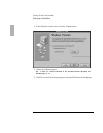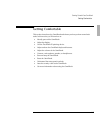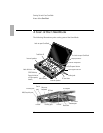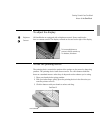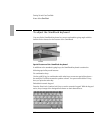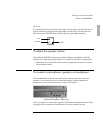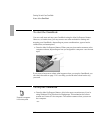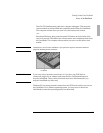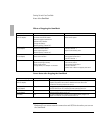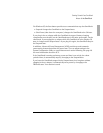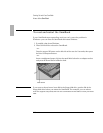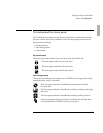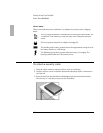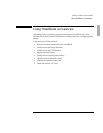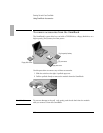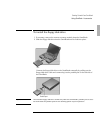
Starting Out with Your OmniBook
A tour of the OmniBook
1-14
Effects of Stopping the OmniBook
When you press this
The OmniBook does this
Limitations of this method are
On/Suspend button
(with ac adapter)
Turns off the display.
Continues the current session.
Maintains network connections.
Maintains SCSI devices.
Charges the battery.
Restarts quickly (
“
Instant-On
”
).
Requires ac power.
Saves minimal power.
On/Suspend button
(no ac adapter)
Turns off the display.
Maintains current session.
Saves significant power.
Restarts quickly (
“
Instant-On
”
).
Loses network connections. ∗
Loses SCSI devices. ∗
Requires some battery power.
Fn+F12 button
(no ac adapter)
Saves maximum power.
Saves current session.
Reboots at startup.
Loses network connections. ∗
Loses SCSI devices. ∗
Off button
Saves maximum power.
Resets everything at startup.
Starts a new session.
Charges battery if ac adapter is connected.
Reboots at startup.
Loses current session.
Loses network connections. ∗
Loses SCSI devices.∗
Potential loss of data if not properly shut down.
Power States after Stopping the OmniBook
Method of Stopping
Power State
Condition
On/Suspend button
(with ac adapter)
Display Off
Powered/operating state. The computer looks off, but only the display,
keyboard, and pointer are turned off. Network and SCSI devices are
maintained. Everything continues at turn-on.
On/Suspend button
(no ac adapter)
Suspend
Low-power/stopped state. Everything is off or in a low-power state. Network
and SCSI devices are off. Everything resumes operating at turn-on.
Fn+F12 button
(no ac adapter)
Hibernate
No-power/stopped state. Everything is shut down. Computer reboots and
restores previous session at turn-on.
Off button
Off
No-power/stopped state. Everything is shut down (battery charges if ac
adapter is connected). Computer reboots at turn-on.
∗
Windows 95 can restore network connections and SCSI devices when you turn on
the OmniBook.



